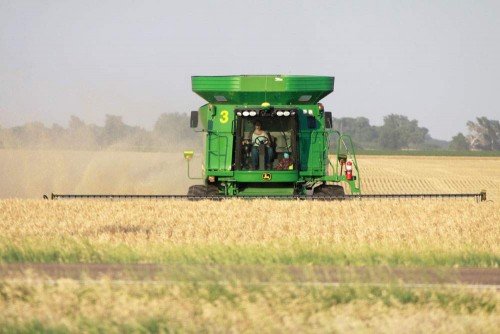Record yields and strong gains in soybean and sorghum crop values couldn’t offset the big declines in wheat and corn prices in 2013.

Despite strong gains in the value of the 2013 Kansas soybean and sorghum crops, the total crop value in the state declined 4 percent from last year, the National Agricultural Statistics Service reported.
The 2013 crop is estimated at $7.79 billion, down from $8.08 billion in 2012. This is still up from the $7.39 billion crop in 2011, though officials from the Dallas and Kansas City Federal Reserve have estimated that the coming years will more difficult for farmers following the peak in yield and prices in 2012 and 2013.
Total crop value is estimated by multiplying the marketing year average price by the production.
The value of the wheat crop decreased 22 percent to $2.22 billion from $2.83 billion in 2012. Grain corn was down 13 percent to $2.31 billion from $2.67 billion.
Record yields, uncertainty about federal ethanol requirements, increasing overseas competition from east Europe and Brazil, and trade disputes over exported genetically modified grains have all been attributed to the declining prices.
The national field and miscellaneous crop value dropped 9.7 percent from 2012, from $185 billion to $167 billion. Total crop values which include fruits and nuts and commercial vegetables are not yet available.
The total value of soybeans jumped 30 percent to $1.59 billion from $1.23 billion in 2012. The sorghum for grain crop also saw a boost of 24 percent, from $550 million to $680 million. The Kansas milo crop accounts for a little more than one-third of all domestic production.
The boost in the milo crop value was despite a 40 percent decline in the average price per hundredweight, from $12 to $7.35, a testament to 2013s yields. The value of the Texas milo crop was higher than Kansas in 2012 when it more than doubled its milo crop value from the previous year.
Kansas ranks fifth nationally in the value of field and miscellaneous crops in 2013, behind Illinois, Iowa, Nebraska and Minnesota.
Low feed prices in combination with the smallest domestic cattle herd in 63 years have created a boon for herders, who are seeing the highest retail beef prices in history.
But due to the lack of supply, National Beef decided to shut down its 1300-worker plant in Brawley, Calif., starting in April for an indeterminate amount of time.
Dodge City officials have been told that no similar plans are being made for the local plant.
By Christopher Guinn

